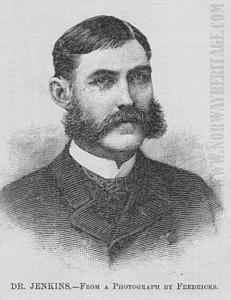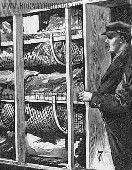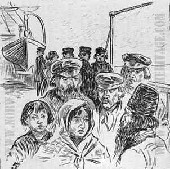OUTBRAKE OF CHOLERA AND QUARANTINE AT NEW YORK HARBOR 1892
From Harpers Weekly Journal of Civilization September 17, 1892 - Transcribed by Børge Solem, 2005
Transcriptions of two articles about the quarantine facilities and outbreak of Cholera in New York harbor 1892, originally printed in the Harpers Weekly Journal of Civilization September 17, 1892.
CHOLERA AND OUR QUARANTINE. But when we look calmly at the situation, shorn of the lurid accessories for which a certain type of modern journalism is largely responsible, it will be seen that, aside from a few places in which barbaric lack of sanitation is reaping the harvest for which it has so heedlessly prepared the field, there seems to be but little actual danger that the dreaded disease will find any considerable general foothold.
The first great gain which we may count upon in staying the progress of the disease is that we know, beyond any possibility of doubt today, precisely what causes it, and just exactly what we must do to destroy and make harmless the noxious agent. To know that the infections germs do not travel in the air, do not surround their victims with an intangible and deadly atmosphere, do not lean from place to place in some mysterious way, but are particulate bodies which can be studied and handled and killed, is to have banished superstition and nameless terrors from the problem, and put it upon a rational and tangible basis. The control of the cholera is simply a matter of sanitation and disinfection. That is, of putting exposed well people under such conditions that they will not be liable to come in contact with the disease germs, or be susceptible to them if by some mischance they do, and of destroying as fully as possible all the germs as soon as they may become freed from the bodies of those already stricken. If these two conditions can be fulfilled, Asiatic cholera will not spread. But their absolute fulfillment is our only guarantee of success.
The practical solution of the problem of limiting the spread of the disease falls happily into two very distinct lines, namely, those things which must be done by the health officials, and, not less important, those things which must and must not he done by the people. So far as the duties of health officers are concerned, they are clear and precise, and the degree of success which will attend their efforts will depend upon the intelligence and ceaseless vigilance which they bring to the service of their fellows.
Happily in this country there seems to be no doubt in the minds of the officials that cleanliness is now not only nearest to godliness, but is in some measure a sharer in its beneficent influences as a national safeguard. "In God we trust," but we are not unmindful of drains and dirt.
The maintenance of an efficient maritime quarantine, which is the most important wholesale protection of a country against the scourge, has at its base, it must be confessed, a principle which at first seems to savor not a little of the direct and bold application of the barbaric instinct of self-preservation at whatever cost, since the detention of infected ships with their passengers involves the principle that the few must, if necessary, suffer for the universal good.
But as we write, the great danger to individuals who are isolated in infected ships seems in a fair way for removal, at the port of New York at least, by their transfer from those ships to land, and their care in camps in which such perfect sanitation can be attained as is wholly impossible on a crowded ship. Modern maritime quarantine differs fundamentally from the simple and often dangerous detention of large groups of people who have been exposed to infection. all together on a single ship, in that it provides for their separation into small groups, which are kept stringently apart, so that any outbreak in one group not only does not endanger the health of other groups, but does not at all tend to prolong the time of necessary detention of those isolated companies in which no such misfortune has occurred. Moreover, this removal of passengers from an infected ship, and this alone, renders possible an absolute and certain disinfection of the ship and its furnishings.
The necessary period of quarantine detention for ships varies greatly with the nature of the disease to be guarded against and the circumstances attending each particular ship. The tendency of modern sanitation is decidedly and properly towards allowing to health officials a considerable degree of discretion in deciding the matter, as circumstances may vary. Any serious tendency towards the making of inflexible rules in this particular is unfortunate, because it does not take into account the wholly rational and purposeful measures which may be adopted to make even an infected ship safe. If the responsible health officer at any port is intelligent and educated and experienced, and is endowed with good judgment, he may be safely trusted to largely make his own rules; and if he be not thus endowed he is by no means the proper person for a position so delicate and responsible, and involving such large interests both of life and property.
Many will suffer, and suffer keenly, before the difficulties of the time are over, from the inconvenience of detention and its inevitable associated dread, and perhaps peril. But with the adoption of a land quarantine and the grouping principle in isolation, whatever actual dangers are associated with detention of infected ships would be largely removed, and the average period of necessary quarantine very much shortened.
It would be well if we who are safe ashore realized a little more fully that those detained in quarantined ships are suffering at least annoyance and apprehension, and perhaps peril, not for their own sakes, but largely for ours.
So far as the actual duties of the people are concerned, it is fortunate that they are sufficiently important and urgent to secure attention to sanitary details among the intelligent, and to demand fulfillment under stress of official force among the ignorant and careless.
Such a scurrying of belated and negligent officials was never witnessed before in this country, and with every day in which the disease is successfully warded off the probability of its rigid control grows brighter should it in spite of official efforts find here and there a foothold.
Boards of health have liberally advised the people what individually and collectively they should and should not do while, going about their usual business, they await events, as well as in case of an invasion. So, on the whole, it seems highly probable that the achievements of modern preventive medicine are, after all, to be of avail in their beneficent suggestions. There will be many lessons to be learned and cherished, whatever the outcome of the present stress may be. Whether these lessons are learned at the price of vigilance and intelligence alone on the part of all, or at the bitter cost of life and suffering, we may not surely say. But in whichever case it cannot be doubted that our country and the world will be cleaner, and, in health affairs, more wisely managed, in the years to come.
CHOLERA IN NEW YORK BAY.
In August a number of Russian Jews arrived in Hamburg to take passage for America. It was found that there was cholera among them. No announcement was made of this fact by the public authorities of Hamburg, but the infected persons and those suspected of infection were isolated in a camp above the city and on the banks of the Elbe, into which the drainage from the camp emptied. The water for drinking and cooking in Hamburg comes from the Elbe. In a little while there were cases of cholera in Hamburg, and among the regular residents of the city. These cases were also concealed by the authorities, and it was not known in Hamburg till the plague had become epidemic that cholera had reached that town. On the 17th of August the Moravia, a two-masted steamer of the Hamburg line, sailed from that city with 385 steerage passengers, and she brought with her a clean bill of health from the American consul, who certified that when the ship sailed there were no infectious or contagious diseases prevailing in Hamburg. The American consul was deceived, like the rest of the world. The Moravia arrived in the lower New York Bay Tuesday night, August 30th (1892), and the next morning she had anchored near the Quarantine Station on Staten Island, and close by several other ships that arrived during Tuesday night.
When the health officer boarded the Moravia, he was blandly told by the captain and the ship's surgeon that the boat had a clean bill of health, and that they were in a hurry to get into the ship's dock. An examination of the surgeon's report showed that there had been twenty-four cases of "cholerine" and twenty-two deaths during the voyage. The health officer at once ordered that the Moravia should steam to lower Quarantine, in the outer bay. A little examination showed that the "cholerine" on the Moravia was Asiatic cholera of the most fatal type, as ninety per cent of those attacked died, and died quickly after showing the first symptoms. When fifty per cent of those attacked by cholera succumb, the disease is considered to be very virulent. It is unlikely that those on the Moravia had proper nursing or medical attention. The doctor had not even taken the temperature of those who were ill.
When on Wednesday afternoon it was announced that there was cholera on a ship in the bay, there was a good deal of excitement in New York and the rest of the country. The President of the United States, who was visiting Mr. Whitelaw Reid in Westchester County, New York, hurried to Washington. The next day he issued a proclamation declaring that all ships sailing from infected ports after the date of the proclamation should be kept in quarantine for twenty days after their arrival in any port of this country. During the next forty-eight hours there were many arrivals of ships, and all of those from Europe were detained a longer time than is usual, and the examinations were less perfunctory than at ordinary times and when the surgeon reports that all on board are well. But there were no new cases. Meantime the Board of Health in New York and the civic authorities were bestirring themselves to fight the plague should it get ashore. Streets were flushed with water and disinfected, and the Board of Health issued rules by which people should be guided in their efforts to prevent taking the cholera. At Quarantine, where the health officer had an entirely inadequate force of assistants, every one appeared to be overworked, but Dr. Jenkins seemed always to be cheerful, and full of hope that he would succeed in keeping the plague out of the city.
On Saturday, September 3rd, three more ships of the Hamburg-American line arrived in the lower bay. These were the Normannia, the Rugia, and the Stubbenhuk. The last of these boats, with 232 steerage passengers aboard, was free from infection, but the Rugia, which had sailed from Hamburg on August 21st with 98 cabin and 436 steerage passengers on board, and had touched at Havre two days later, reported several deaths from cholera at sea. And the Normannia, which had sailed from Hamburg August 26th, and Southampton August 27th, and which carried 488 cabin passengers and 482 steerage passengers, also had had cholera deaths at sea. Among the cabin passengers on this ship were many prominent New York people. All the deaths on both ships were in the steerage. That day there was also another death on the Moravia. The State of New York owns two islands in the lower bay, and these are used for quarantine purposes. To Hoffman Island the steerage passengers from the infected ships were taken and bathed while the ships were being disinfected. To Swinburne Island were taken those who were sick with the cholera, or suspected of infection. What was to be done with the cabin passengers on the Normannia and the Rugia became at once a serious question. Just here the foresight of the quarantine authorities appears to have been very greatly at fault. Here were nearly six hundred well people shut up in infected ships on which deaths from the infection were of daily occurrence, with the only water aboard that from the polluted Elbe. For many days there was no practical solution of this problem, and from the ships came daily pathetic appeals for help and indignant protests against what the imprisoned passengers thought official heartlessness and incompetence. Both appeals and protests were but natural.
Among the passengers signing these protests were United States Senator McPherson, of New Jersey; Mr. E. L. Godkin, editor of the New York Evening Post; the Rev. Richard D. Harlan, of New York; and Mr. A. M. Palmer, the well known theatrical manager. The mails that came by the Normannia were fumigated by the quarantine authorities, and delivered at the New York Post-office. Lottie Collins, the dancer and singer, who has made famous the song "Ta-ra-ra-boom-de-ay," was also among the Normannia's passengers. She has received much free advertising in consequence, but as she loses the $200 a night which she was to have received for every night she sang, it is somewhat trying.
A large fleet arrived on Sunday, but there was no infection on any of these. La Bourgogne, as coming from an infected port, was detained four days. During the day there were two deaths in the lower bay on the Normannia, one on the Rugia, and one on the Moravia. In his visit that day to the Normannia, Dr. Jenkins threatened the cabin passengers who tried to communicate with the shore by letters or telegrams thrown to tugs with a full twenty days of quarantine.
On Monday, September 5th, the record on the ships in the lower bay and on Swinburne Island was three deaths and six new cases. The deaths were a member of the Normannia's crew, a steerage passenger on the Rugia, and a child from the Normannia's steerage on Swinburne Island. There were no arrivals of infected ships. There were consultations between Secretary-of-the-Treasury Foster and Dr. Jenkins as to the disposition of healthy passengers on infected ships, but no conclusion was arrived at. Around the infected ships was placed a police patrol. The Superintendent of Police explained to the river police patrol that volunteers were needed for this service, and that those who went on it would be cut off from their families and from all connection with the shore until the emergency was ended. Then he asked for volunteers to step one pace forward. As one man every man in the patrol stepped to the front, so he had to make his selections after all. Dr. John M. Byron, the bacteriological expert, had gone to Swinburne Island the day before to take charge of the hospital, and conduct an investigation of the cholera germs. He too will be shut off from the rest of the world so long as there are any cholera cases on the island.
The record of Tuesday was one death and twelve new cases in the lower bay. The cholera seemed to have got hold of the crew of the Normannia, for four of those stricken that day were in the forecastle of this ship, still crowded with cabin passengers. Secretary Foster offered to Dr. Jenkins the government reservation on Sandy Hook as a camp of refuge for these passengers, but Dr. Jenkins arrived at no decision as to accepting it. The next day eight more of the Normannia's crew were stricken and two of the Rugia's steerage, but there were no deaths. Dr. Jenkins this day said that he preferred Fire Island, where there is a summer hotel and cottages, for the healthy passengers of the Normannia and Rugia. Nothing was, however, done on Wednesday to advance the matter. Provision was made, however, to prevent cholera-infected ships from coming into New York by the way of Long Island and through Hell Gate. On Thursday there were four deaths and ten new cases, six of the new cases being members of the Normannia's crew. This day Mr. Pierpont Morgan announced to Dr. Jenkins that he had purchased the steamboat Stonington, on which the passengers of the Normannia and other ships could be taken. Dr. Jenkins accepted the boat, and she at once started to New York to be fitted up for her new service. She was ready for the reception of the passengers by Saturday morning. The hulk of the old war-ship New Hampshire was also put at Dr. Jenkins's disposal, and she too had been fitted out by Sunday morning. The record of Friday was one death at Swinburne Island, two deaths on the Guion line Wyoming, which had arrived Tuesday evening from Liverpool, and had been since then lying at upper Quarantine, and another case among the crew of the Normannia. The Wyoming was now sent to the lower bay to join the infected fleet. During the day negotiations were in progress for the purchase, in behalf of the State, of the summer hotel property on Fire Island. Work was also begun at Sandy Hook, at the expense of Mr. Austin Corbin, and under direction of Dr. Hamilton and Engineer Jacobs, to make a camp for healthy passengers.
On Saturday morning the worst infected ship of all arrived. This was the Scandia, of the Hamburg-American line. She sailed from Hamburg on the 28th of August, with 28 cabin and 981 steerage passengers, and a crew of 77. On the way over there were 32 deaths, and when the ship arrived in the lower bay there were seven sick. These were taken to Swinburne Island. That day two of the sick died, and there were two new cases. There were no other new cases in the cholera fleet. Late in the afternoon the cabin passengers from the Normannia were taken aboard the Stonington, which laid in the lower bay off the spit of Sandy Hook all night. During the day the negotiations for the purchase of the summer hotel property were completed, and Mr. Sammis, the owner, agreed to take $210,000. Governor Flower personally advanced $50,000 of the purchase price, and personally guaranteed the payment of the balance in - six months. Sunday morning President Wilson went to Fire Island to complete the contract and make the first payment. He was met there by a committee of 150 from Islip to protest against the use of Fire Island for quarantine purposes. These men from the neighborhood threatened to burn the hotel property rather than have it used for quarantine purposes. During Sunday the first money of the purchase price was paid to Mr. Sammis, and the State acquired the title of Mr. Sammis's 125 acres.
Meantime the Stonington, with the cabin passengers of the Normannia aboard, had been declared unseaworthy, and about half of them were transferred to the iron steamboat Cepheus. The Cepheus went to Fire Island, but the local pilot was intimidated by the Islip men, and refused to bring the steamboat in, so she sailed back to the lower bay. So far as comfort goes, the Normannia passengers are worse off than ever.
The fact that no cases have broken out among the cabin passengers of the Normannia is very reassuring, as it indicates that by cleanliness and careful living the infection may be avoided.
The ravages and spread of the cholera, the theme of thought and talk and dread in nearly the whole civilized world today, would almost make it seem as if the much-vaunted achievements of medical science in the prevention of disease had been overrated, and that, after all, the old stories of the plague might be entering upon a new and vivid rehearsal.
At the quarantine station, New York harbor: 1. Transfer of Steerage Passengers to Hoffman Island, 2. Detained off Quarantine, Staten Island, 3. The Death-Ship Moravia, 4. Passengers Waiting for the Doctors, 5. Reporters talk with the Doctor, 6. Friends of the detained Passengers signalling from Shore
When this paper went to press the plague had arrived from Europe, and had been in the outer bay of New York for more than ten days, but cholera had not found lodgment ashore. In a previous issue of the WEEKLY the course usually taken by cholera - which to some extent always exists in Asia - when it gets into eastern Europe and starts on a westward march, was traced, and it was shown that the only possible chance that this country had to escape the ravages of this dread disease was by a wise and vigilant quarantine of all the ports of the country. The port of New York, to which more than ninety per cent of foreign emigrants come, is of more importance than all the rest of the American ports combined. The quarantine of the port of New York is in charge of a commission appointed by the Governor of New York, and the chief executive officer of this commission is Dr. William T. Jenkins, a native of Mississippi, and in age a little past forty years. He was recently appointed to this very important position, and before the importation of cholera had been called upon to repel a threatened invasion of typhus, which came as cholera has come, with immigrants from Russia. During July and August the cholera, which first appeared on the Caspian Sea, spread gradually over Russia, and got a foothold in Germany, France, and Austria. Before the end of August cholera in an aggravated form had broken out in Hamburg, a city of about 360,000 population, on the river Elbe at its junction with the Elster, and sixty miles from the sea. From Hamburg come to this country a large percentage of the Russian and Polish emigrants, and there is a large fleet of steamers belonging to the Hamburg American Packet Company plying between the German city and New York. The smaller of the ships of this line carry few except steerage passengers, but the large boats, such as the Normannia and the Columbia, touch at Southampton, in England, and usually carry a full complement of saloon passengers.
Dr. Jenkins

Hoffman Island, Quarantine Sation, New York harbor
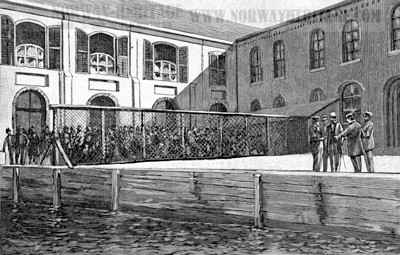
The Consultation of Doctors on Hoffman Island, New York harbor 
The Quarantine station at Swinburne Island, New York harbor
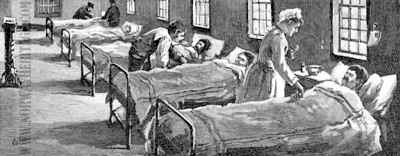
From the Quarantine Hospital at Swinburne Island, New York during the Cholera outbrake in 1892

